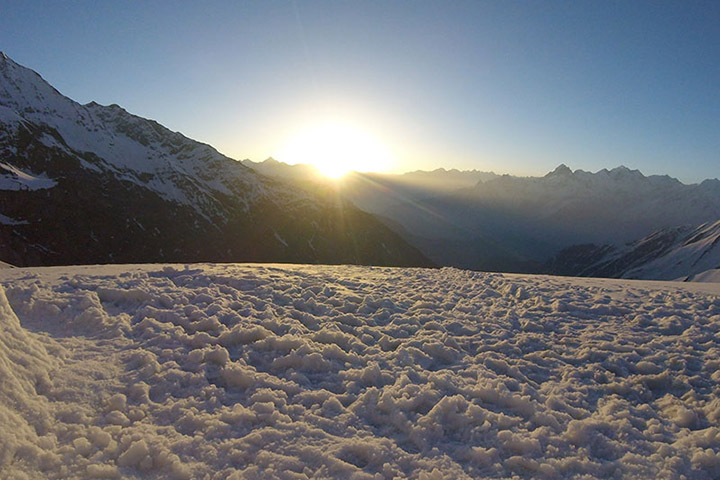
31 Mar Striking distance learning
It’s hard to believe that in just a matter of weeks, so much in our world has changed, with the Covid-19 global pandemic encroaching on all areas of life, including how we deliver a quality Woodstock education through our distance learning programme.
Last week we entered a new era in the school’s history as we transitioned the Woodstock educational experience over to our distance learning model. We are not alone in making this transition. According to UNESCO, more than 87% of the world’s student population has been impacted by school closures. Many will have shifted to digital models; tens of millions more will have no structured education at all for the foreseeable future.
The enormity of the task undertaken over the past few weeks should not be underestimated. I can’t express enough appreciation for the efforts of our academic and support teams to move to distance learning in such a nimble and effective manner over the past two weeks. Thanks also for our adaptable students who when faced with their lives being flipped upside down, have embraced the change. Resilience is something we’re always tried to cultivate in our students, but it’s very hard to test until you are faced with true adversity. At a time when they’re anxious, frustrated and are missing their friends, they’ve taken to distance learning with great gusto.
One of the greatest challenges we face is how to deliver all that is unique about a Woodstock education remotely, to retain that quality and that spirit. Make no mistake, there are elements that you just can’t replace online – our amazing natural environment here and the camaraderie fostered by life in dorms, to name a few. But there is much of our educational experience which can be carried over to this new paradigm and practice.
The blizzard we’re now metaphorically walking through could be the beginning of a mini ice-age, of sorts. No one can know when this storm will be over, but we can be sure that when the skies clear, the world will be a very different place than it was prior to Covid-19.
We’re doing our best to deliver an online education that brings us together, even if we’re not face-to-face, by having assemblies, homeroom and advisor meetings, and by teachers being available when students need them. I held four question and answer sessions last week with students, and also attended the senior homeroom, as a way of making myself available to students. We realize that we have to take a flexible approach, particularly when students are spread across different time zones. By taking an asynchronous approach, recording classes, and providing students with clear schemes of work and expectations for each week, we seek to elicit the best from them no matter where in the world they find themselves now. Students have gotten off to a great start, but we appreciate that to maintain their attention and enthusiasm, we need to deliver a programme that continues to engage, challenge and reward them.
Prior to joining Woodstock, I personally taught three courses online annually for the last 16 years. My experience in online learning indicates that it does lend advantages that you can’t always realize in the face to face classroom. Perhaps counter-intuitively, it’s easier to hide in a classroom than in the virtual world. Distance learning is the ‘confessional booth’ of education – as a student you really have to confess, so to speak, what you know and to share where you need support. As an educator, it gives you the opportunity to see what everyone is thinking, so that you can meet the needs of every student and not just some.
I have found that the distance learning environment actually strengthens peer learning, encouraging students to more proactively find new ways and directions in which they can work together. It builds equity between students as they work collectively, and enables students who don’t naturally have the most forthcoming personalities to contribute on a level playing field. We also are an incredible step ahead compared to a conventional online education programme in that our teachers already know our students. They have built trust at an emotional level in person and they know their students’ strengths, and where they will need coaxing to get the best out of them.
One of the analogies I’ve read recently is that the blizzard we’re now metaphorically walking through could be the beginning of a mini ice-age, of sorts. No one can know when this storm will be over, but we can be sure that when the skies clear, the world will be a very different place than it was prior to Covid-19. It will fundamentally change many of the ways we do things as a society going forward. Just what that means will only become evident with time, but you can be sure that this is just the beginning. If this virus has taught us anything it is to not underestimate it. Let’s begin to overestimate it, with its potential to produce second and third tier consequences in our lives which we may not even be aware of now. We’ve tried to stay ahead of the arc of the crisis throughout these weeks, and we will continue to attempt to lead through the blizzard. Thank you, as Woodstock parents, alumni and friends, for being there by our sides as we do so.
Dr Craig Cook, Principal






Swati Bhushan
Posted at 00:43h, 01 AprilVery well said sir …..trully this is a time to learn what we had never explored before …..and we emerge out as life long learners ……..thanks to covid 19 ….:)